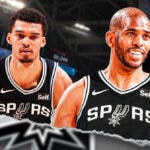After crunching the numbers, breaking down the film and approaching the Western Conference Finals from every possible angle prior to its beginning, the ending still felt inevitable. Tossing out any number of reasons the Houston Rockets could and should have won the series was likely countered with a simple caveat.
“Houston won 65 games and had the best net rating in the league!”
Yeah, but it's the Warriors.
“Houston has two Hall of Fame guards in the backcourt!”
Yeah, but it's the Warriors.
“Houston has a dominant unit on both ends of the floor, is designed specifically to beat Golden State and has homecourt!”
Yeah, but it's the Warriors.
There's a bit of reductionism being applied, but at its core, Golden State was viewed as the heavy favorite for one overarching reason this year. Simply put, the Warriors possessed another gear yet to be revealed following a year in which they sleepwalked through the regular season, failing to win 60 games or secure the West's No. 1 seed for the first time since 2013-14.

That feeling of inevitability isn't singular to the Warriors' dynasty (yes, dynasty, after they likely dismantle an overmatched Cavs team and win their third title in four years). The New England Patriots have it; Nick Saban's Alabama Crimson Tide have it; I'd imagine MJ's Chicago Bulls' teams had it; LeBron has wielded it over the rest of the Eastern Conference for eight consecutive years. No matter the circumstance, situation or context, their downfall felt, or feels, mythical and inconceivable.
So, even when Golden State dropped Game 5 and was pushed to the brink of elimination, facing the unfamiliar possibility of its season coming to an end before June, victory still felt inevitable for Houston — even more so when a hobbled Chris Paul was relegated to sideline cheerleader for the final two games with a right hamstring strain.
Even when Houston came out guns blazing and jumped out to a 17-point first-quarter lead in Game 6, inevitability still loomed, acting as crumbled bridge that stood between the Rockets and their path to the NBA Finals.
Even when Houston held an 11-point halftime lead at home in Game 7 with a Finals berth on the line, inevitability prevailed. At that point, oddsmakers gave Houston roughly a 55 percent chance to win. My gut generously gave them a 20 percent chance.
Part of what makes these Warriors and their dominance inevitable are those trademarked third-quarter onslaughts.

You know the flood is coming. The opponent cools off, the Warriors ratchet up their defensive intensity and one of Golden State's three historically great shooters takes over (usually Stephen Curry). The Warriors absorb the opposition’s best strike in the first half and respond with a counterpunch that could knock out peak Muhammad Ali.
Since its championship run began, Golden State has led the league in third-quarter net rating each season. During this year's playoffs, the Warriors morphed into a supreme juggernaut, vaporizing anything in their path and registering a plus-33.1 net rating, tops among all postseason clubs. Against the Rockets, that number jumped to plus-42.7.
The Warriors' third quarters won them this series. In the seven games, they were a combined plus-68 in the third and minus-5 in the first, second and fourth quarters. On Monday evening, as he's done time and time again throughout his prime (and this series), Curry buried a team with a supernova quarter.
The Rockets hung tough in the third, even holding the lead as late as the 4:30 mark. Then, Steph happened. He gave Golden State its first edge since 9-7 with the play that's sweeping NBA Twitter by storm:

The Jordan Bell-Curry trickery sparked a personal 11-2 run for Curry in just 1:47 of game action as Golden State seized control with every bucket more crushing than its predecessor.
His fifth and final score of the quarter, which capped off the 11-2 run, was vintage Curry. Like a pin to a balloon, it seemed to violently drain the air from the Toyota Center as it came after Houston had just misfired on two open three-pointers (a common theme in this contest as the Rockets missed 27 straight threes at one point).

Curry closed the period with 14 points (5-of-6 shooting, 4-of-5 from deep), six rebounds, three assists and the spirit of one entire city crushed. For the night, he quietly bagged 27 points, (10-of-22, 7-of-15), 10 assists, nine rebounds, four steals and one block. But it was that 107-second stretch of pure magic and electricity from Curry that powered the Warriors to another NBA Finals.
Oddly enough, it felt predictable, inescapable and mesmerizing all at once. I expected the run to come and the hammer to be dropped. Most did. Because that's what historic teams do. They engrain that feeling of inevitability within audiences.

This was by far the Warriors' bumpiest ride to the Finals. Curry was seemingly dinged up for the entire year; Draymond Green didn't look right for most of the regular season; Kevin Durant missed time due to injury; they were on the losing end of far too many blowouts where they looked sluggish, disinterested and unengaged; Houston was on par with the 2016 Thunder as Golden State's stingiest Western Conference challenger.
And yet, most NBA intelligentsia never doubted them, hypnotized by their inevitable greatness.
The Warriors' third-quarter runs and Stephen Curry's wave of triples have become emblematic of this franchise's identity. Inevitable, beautiful, predictable, unceasing. Because that what dynasties do. They serve as constants in landscapes that are always in motion around them.
Houston's two-guard juggernaut was new, it was flashy and it was dominant. But in the end, it was two of Golden State's defining traits that did the Rockets in: an overpowering third quarter and an indefensible run from Curry.
The Rockets may return next season with a healthy Chris Paul and a retooled roster to knock off Golden State, but nothing they do feels inevitable. That power belongs solely to the Warriors and it's the mark of a dynasty.




